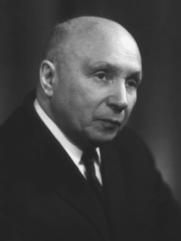Isaac Babchin was born in 1895 in Vilna (present-day Vilnius, Lithuania). His father, Savely, was a merchant of the First Guild in St. Petersburg, and the family was a wealthy one. The children received a good education. Isaac was admitted to a commercial school, despite the quota on Jewish students. However, his true vocation was medicine, rather than commerce. Against the backdrop of World War I and the Russian Revolution, Isaac Babchin enrolled in a Medical Institute in Leningrad and graduated from it. Having decided to specialize in surgery and traumatology, Babchin ultimately chose to practice neurosurgery.
Undoubtedly, this choice was influenced by Babchin's teacher, the prominent neurosurgeon Andrei Polenov. With him, Babchin practiced brain and spine surgery.
1938 saw the establishment of the Leningrad Institute of Neurosurgery, where Isaac Babchin became Andrei Polenov's deputy for scientific work.
Following the outbreak of the Soviet-German War in June 1941, Isaac Babchin was called up for service. From the first days of the war until the last, he was actively involved in it. Babchin served as chief neurosurgeon of the Leningrad Front. In addition to performing complex surgical operations under enemy fire, he had to hold conferences and write methodological recommendations. He also kept a "War Diary", which would later be published.
In 1944, Isaac Babchin was promoted to Major General of the Medical Service. In the course of the war, he was awarded the Order of the Patriotic War, 1st Class; the Order of the Red Star, and several medals.
In December 1945, after his demobilization, Isaac Babchin resumed working at the Leningrad Institute of Neurosurgery, and he was also head of the Department of Neurosurgery of the Leningrad Institute for the Advanced Training of Physicians. In the late 1940s and early 1950s, at the height of the anti-cosmopolitan campaign and in the run-up to the "Doctors' Plot", he was fired from all his posts. After Stalin's death in 1953, he was fully rehabilitated. However, this unpleasant episode permanently blocked his prospects of advancement in his academic career – e.g., he was not given due recognition by the Academy of Medical Sciences. Nevertheless, Babchin remained an outstanding neurosurgeon, widely respected by his colleagues and students, and he continued working until the age of 75. Even after his retirement, he remained professionally active, writing monographs and articles.
Isaac Babchin died in 1989.







